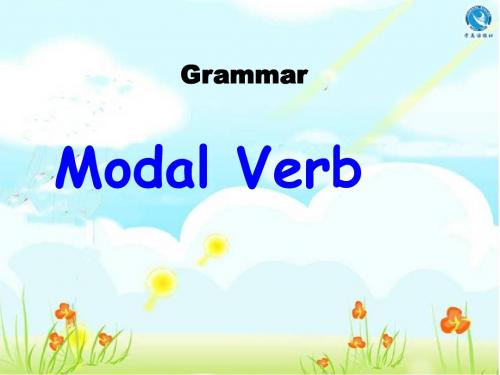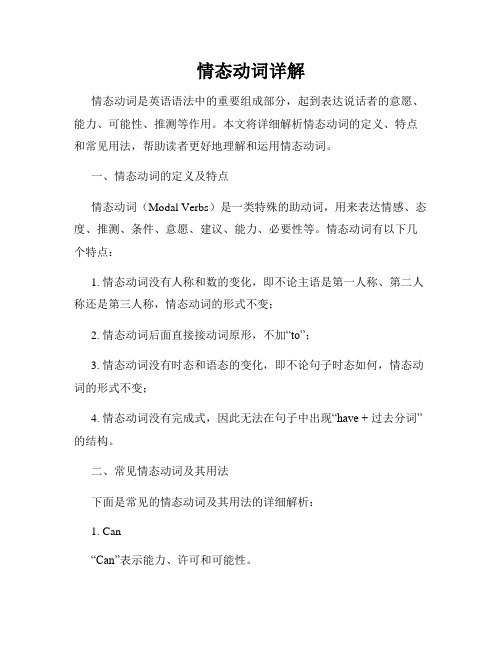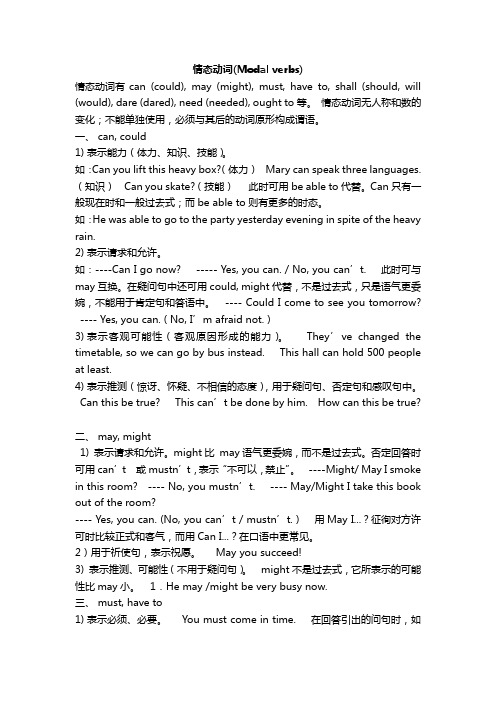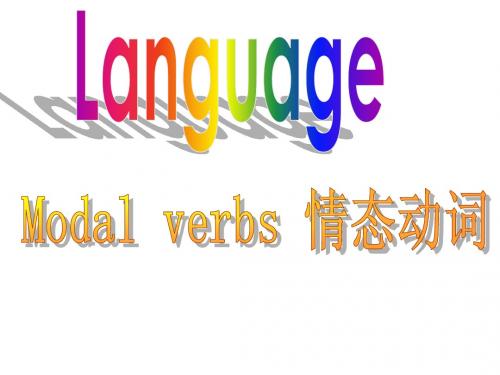Modal Verbs 情态动词
modal verb(情态动词)

Modal Verb
什么是情态动词? (Modal Verbs) 情态动词表示说话人的某种 感情或语气,对某一动作 或状态的某种态度。 表示“需要、可以、 必须、应当”等。
情态动词的语法特征
1. 情态动词不能单独做谓语,除ought 和have外,后面只能接不带to的不定式。 2. 情态动词没有人称,数的变化,但有 些情态动词,如can, will也有一般式 和过去式的变化。
may 常用来表示: A. 表示请求、允许: B. 表示说话人的猜测: “也许” “可 能”: 通常只用于肯定句和否定句中。
C. 表示祝愿; 但语气较正式: might 的用法有: 多在间接引语中表示过去的可能和允 许。如: She said that he might take her bike. 她说他可以拿她的自行车去用。
表示现在的许可,语气比may 较委婉,
一般用于疑问句(包括间接疑问句),
不可用于肯定句或者否定句。
如: Might I have a word with you?
我可以和你说句话吗?
will和would
1. will是助动词还是情态动词?
will用于构成将来时是助动词。
用于表示“意志”“决心”“请求”是
2. 表示否定的情态动词的用法:
部分情态动词的否定式是情态动词中的 考点之一。 mustn’t 不准; 禁止 needn’t 没必要 ( = don’t have to ) can’t 不能; 不可能 may not 不可以; 可能不 shouldn’t 不应该 ( = ought not to )
表示主语的义务或责任: You should take care of your sister. 你应当去照顾你妹妹。 或指出一个正确、明智的动作: They shouldn't allow parking here; the street is too narrow. 这儿不该允许停车;马路太窄了。
情态动词详解

情态动词详解情态动词是英语语法中的重要组成部分,起到表达说话者的意愿、能力、可能性、推测等作用。
本文将详细解析情态动词的定义、特点和常见用法,帮助读者更好地理解和运用情态动词。
一、情态动词的定义及特点情态动词(Modal Verbs)是一类特殊的助动词,用来表达情感、态度、推测、条件、意愿、建议、能力、必要性等。
情态动词有以下几个特点:1. 情态动词没有人称和数的变化,即不论主语是第一人称、第二人称还是第三人称,情态动词的形式不变;2. 情态动词后面直接接动词原形,不加“to”;3. 情态动词没有时态和语态的变化,即不论句子时态如何,情态动词的形式不变;4. 情态动词没有完成式,因此无法在句子中出现“have + 过去分词”的结构。
二、常见情态动词及其用法下面是常见的情态动词及其用法的详细解析:1. Can“Can”表示能力、许可和可能性。
能力:用于表达某人在某方面具有的能力或技能。
例句:He can speak three languages.许可:用于征求或给予许可。
例句:Can I borrow your pen, please?可能性:用于表达可能发生的情况。
例句:It can rain tomorrow.2. Could“Could”是Can的过去式,表示过去或虚拟条件下的能力、许可和可能性。
能力(过去):用于表达过去具备的能力或技能。
例句:When I was young, I could run very fast.许可(过去):用于过去征求或给予许可。
例句:Could I use your phone yesterday?可能性(虚拟条件):用于表示虚拟情况下的可能性。
例句:If I had enough money, I could travel around the world.3. May“May”表示允许、可能性、祝愿和推测。
允许:用于征求或给予许可。
例句:May I come in?可能性:用于表达主观推测的可能性。
M3-AC14-grammar-情态动词--modal-verbs

情态动词(Modal verbs)情态动词有can (could), may (might), must, have to, shall (should, will (would), dare (dared), need (needed), ought to等。
情态动词无人称和数的变化;不能单独使用,必须与其后的动词原形构成谓语。
一、can, could1)表示能力(体力、知识、技能)。
如:Can you lift this heavy box?(体力)Mary can speak three languages.(知识)Can you skate?(技能)此时可用be able to代替。
Can只有一般现在时和一般过去式;而be able to则有更多的时态。
如:He was able to go to the party yesterday evening in spite of the heavy rain.2)表示请求和允许。
如:----Can I go now? ----- Yes, you can. / No, you can’t. 此时可与may互换。
在疑问句中还可用could, might代替,不是过去式,只是语气更委婉,不能用于肯定句和答语中。
---- Could I come to see you tomorrow? ---- Yes, you can. ( No, I’m afraid not. )3)表示客观可能性(客观原因形成的能力)。
They’ve changed the timetable, so we can go by bus instead. This hall can hold 500 people at least.4)表示推测(惊讶、怀疑、不相信的态度),用于疑问句、否定句和感叹句中。
Can this be true? This can’t be done by him. How can this be true?二、may, might1) 表示请求和允许。
情态动词在英语中的用法总结

情态动词在英语中的用法总结1. 什么是情态动词情态动词(Modal Verbs)是一类特殊的助动词,在句子中常与主要动词一起使用,用来表示说话者对某种动作或状态的态度、能力、推测等。
2. 情态动词的列表以下是常用的情态动词列表:- Can(能力、许可)- Could(能力、过去能力、礼貌的请求)- May(许可、可能性)- Might(可能性、推测)- Must(必须、推测)- Shall(意愿、建议、命令)- Should(应该、建议)- Will(意愿、承诺)- Would(愿意、过去惯性动作、礼貌的请求)3. 情态动词的用法3.1 表示能力和许可情态动词 can 和 could 用来表示能力,may 和 might 用来表示许可。
例如:- I can swim.(我会游泳。
)- Could you help me with this?(你可以帮我一下吗?)- May I go to the restroom?(我可以去洗手间吗?)3.2 表示可能性和推测情态动词may、might 和could 用来表示可能性和推测。
例如:- It may rain tomorrow.(可能明天会下雨。
)- He might be late for the meeting.(他可能会迟到会议。
)- Could it be true?(这可能是真的吗?)3.3 表示必须和推测情态动词 must 表示必须,而 may 和 might 用来表示推测。
例如:- You must finish your homework.(你必须完成作业。
)- She may have forgotten the appointment.(她可能忘记了约会。
)- It might rain later.(天后可能下雨。
)3.4 表示意愿和建议情态动词 shall、should、will 和 would 用来表示意愿和建议。
例如:- Shall we go to the movies?(我们去看电影好吗?)- You should take a break.(你应该休息一下。
常见的助动词结构有哪些?

常见的助动词结构有哪些?在英语中,助动词是不可或缺的一部分。
它们可以帮助我们表达时间、态度和情感等各种信息。
本文将介绍常见的助动词结构有哪些。
一、情态动词情态动词(Modal Verbs)是英语中最常见的助动词。
与实义动词不同,情态动词不具备完整的意义。
它们必须与实义动词连用,才能构成完整的意思。
英语中常用的情态动词有 can、could、may、might、shall、should、will、would、must等等。
1.情态动词+动词原形这种结构表示一般的意愿、可能、能力、建议等含义。
例如:- I can swim.(我会游泳。
)- You should study harder.(你应该更加努力学习。
)- We might go to the cinema tomorrow.(我们明天可能去电影院。
)2.情态动词+have+过去分词这种结构表示对过去发生的事情的评论。
例如:- She should have been more careful.(她本应该更加小心。
)- You could have won the game if you had tried harder.(如果你更加努力的话,你本应该能赢得这场比赛。
)3.情态动词+be+现在分词这种结构表示对目前正在进行的事情的推测。
例如:- He must be studying in the library now.(他现在肯定正在图书馆学习。
)- They could be watching TV in the living room.(他们可能正在客厅看电视。
)4.情态动词+have+been+现在分词这种结构表示对过去正在进行的事情的推测。
例如:- She must have been working very hard to finish this project in time.(她肯定非常努力工作才能在时间内完成这个项目。
modal verbs 情态动词

You must not cycle.
You must not enter.
You must be careful.
You must turn left.
You must pay ten yuan.
You must keep silent.
You must not smoke. You must not turn right.
★
情态动词
情态动词不能单独作谓语动词,后接其它 动词原形做谓语,没有人称和数的变化。
1. 表示能够或不能做某事用can 或 can’t;
A bird can fly . Fish can’t live without water.
2. 告诉人们必须或禁止做某事用must
或mustn’t;
You must hand in your homework at once. You mustn’t talk loudly in public.
肯定句 1. 现在时 2. 过去时 1. I can speak Chinese. 否定句 1. 现在时 2. 过去时 1. I can’t speak Chinese.
2. I could speak Chinese when I was a kid.
2. I couldn’t speak Chinese when I was a kid.
subtract ____ Can Kitty _________? Yes, she can. _____________
may (perhaps) 也许,可能
• “may” 常被用来表达可能性,也可以表示 请求。
表示请求: May I use your bathroom? 表示可能性 :I may go shopping in the afternoon. may的过去时 might He might be our new teacher. PS:might也可以表示推测,可能性比may小,语 气更婉转。
Modal Verbs1

Modal Verbs (情态动词)一、情态动词:can, could, may, might, mist, need, ought to, dare, 有时shall, should, will,would 在一定场合下也算作情态动词。
二、情态动词的用法:1.情态动词后接动词原形表示现在的情况e.g. We must work hard at our lessons.We ought to help each other in our study.2.情态动词后接动词的完成形式构成谓语表示过去的情况,意为:“应当已经…,“想必已经…等1). can / could /may / might /must + have done表示对过去事件的推论,意为;“可能”“也许”“一定”已经做了某事。
e.g. The ground is wet. It must have rainedlast night .2). should / ought to + have done 表示本应该做而没有做。
e.g. I should have bought that fashion shoesyesterday, but I didn’t .Your grandfather died. He ought to haveenjoyed his leisure time.3). should not / ought not to + have done 表示本不该做而做了。
e.g. The man is very clever. He ought not tohave done such a stupid thing.4). needn’ t + have done表示做了不必做的事,意为:“本不必”e.g. You needn’t have bought that coat, we canmake one for you.You needn’t have seen me, I will go backthis afternoon.Exercises (情态动词)1. You are late for work again. You ____have been here an hour earlier.A. shouldB. mayC. mustD. could2. That’ s all right. I can deal with it. You ____ with me.A. don’t need goB. need not go toC. need not goD. need go3. To travel from American to England you must have a passport, but to travel from England to Scotland you ____ .A. mustn’tB. can’tC. don’t haveD. needn’t have4. The house is dark. The Greens ____ to bed.A. must have goneB. should goC. should have goneD. must go5. His English composition is not too good, she ___ itherself.A. can’t have writtenB. won’t have writtenC. mustn’t have writtenD. should have written6. My purse was not found . I ____when I was in a train.A. must dropB. had droppedC. should have droppedD. must have dropped7. They didn’t seem surprised when I told them the news. They ___ about it.A. may have knownB. will have knownC. need have knownD. should have known8. The room is in a terrible mess, it ___ cleaned.A. can’t have beenB. shouldn’t have beenC. mustn’t have beenD. wouldn’t have been9. You ____ the job yesterday. We have a secretaryTo do that kind of thing.A. needn’t have doneB. mustn’t have doneC. should have doneD. can’t have done10. You ___her yesterday. She has been out for two days.A. needn’t have seenB. must have seenC. might have seenD. can’t have seen11. He thought it ___ last night.A. couldn’t rainB. couldn’t have rainedC. mustn’t have rainedD. needn’t have rained12. He ___ at the meeting, but I didn’t notice him there.A. must have beenB. would have beenC. may have beenD. must be13. He hasn’t come yet, he ___ an accident.A. must have beenB. would have beenC. may have beenD. must be14. He ___ be Canadian because he has got a Japanesepassport.A. can’tB. isn’t ableC. mustn’tD. doesn’t15. I was really anxious about you . You __ homewithout a word .A. mustn’t leaveB. shouldn’t have leftC. couldn’t have leftD. needn’t leave16. I am not feeling well in the stomach. I ___ so muchfried chicken just now.A. shouldn’t eatB. mustn’t have eatenC. shouldn’t have eatenD. mustn’t eat17. My English-Chinese dictionary has disappeared.Who ___ have taken it?A. shouldB. mustC. couldD. would18. Mr. White ___at 8:30 for the meeting, but he didn’tShow up.A. should have arrivedB. should arriveC. should have had arrivedD. should be arriving19. __ Tom graduated from college at a very young age.__Oh, he ___have been a very smart boy then.A. couldB. shouldC. mightD. must20. __I will tell Mary about her new job tomorrow.__ You ____her last week.A. ought to tellB. would have toldC. must tellD. should have told。
情态动词(Modal Verbs)

另一类意思涉及必须做某事或允许做某 事之类的意思:情态动词可以用来表示 某人必须做某事、某人能做某事,如果 某事发生(或不发生)就会好一些,或 者某事是许可或禁止的。
一、表示有把握的程度 情态动词可以表达对于某一事实 或事件有把握的各种不同程度。
a完全有把握(肯定的或否定的)
1. shall用于第一人称: I/We shall be away tomorrow. I shan’t be late on Wednesday. 2. will 用于各种人称: That’s the phone. That’ll be Tony. Things will be right. It won’t rain this evening. You’ll be right.
情态动词 modal verbs
情态动词 情态动词 的 特点
1)有特定的词义 ) 2)没有人称和数的变化 ) 3)其后加动词原形(do), have done ,be doing. )其后加动词原形
易混易错用的情态动词
1。区别must / have to 。区别 Must表示人在主观上认为的必要、必须、一定要 表示人在主观上认为的必要、 表示人在主观上认为的必要 必须、 Have to表示受环境或习惯支配的客观必要 表示受环境或习惯支配的客观必要 不得不” 能用于更多时态。 “不得不”,能用于更多时态。 1)Soldiers ________obey officers. must have to 2)It’s raining outside.We_________stay at home. 3As he had broken his leg, he had to , ______lie in bed.
can’t, couldn’t
- 1、下载文档前请自行甄别文档内容的完整性,平台不提供额外的编辑、内容补充、找答案等附加服务。
- 2、"仅部分预览"的文档,不可在线预览部分如存在完整性等问题,可反馈申请退款(可完整预览的文档不适用该条件!)。
- 3、如文档侵犯您的权益,请联系客服反馈,我们会尽快为您处理(人工客服工作时间:9:00-18:30)。
Modal VerbsCanCan is an auxiliary verb, a modal auxiliary verb. We use can to:∙talk about possibility and ability∙make requests∙ask for or give permissioncan: Possibility and AbilityWe use can to talk about what is possible, what we are able or free to do:∙She can drive a car.∙John can speak Spanish.∙I cannot hear you. (I can't hear you.)∙Can you hear me?Normally, we use can for the present. But it is possible to use can when we make present decisions about future ability.A.Can you help me with my homework? (present)B.Sorry. I'm busy today. But I can help you tomorrow. (future)can: Requests and OrdersWe often use can in a question to ask somebody to do something. This is not a real question - we do not really want to know if the person is able to do something, we want them to do it! The use of can in this way is informal (mainly between friends and family):∙Can you make a cup of coffee, please.∙Can you put the TV on.∙Can you come here a minute.∙Can you be quiet!can: PermissionWe sometimes use can to ask or give permission for something:A.Can I smoke in this room?B.You can't smoke here, but you can smoke in the garden.(Note that we also use could, may, might for permission. The use of can for permission is informal.)CouldCould is an auxiliary verb, a modal auxiliary verb. We use could to: ∙talk about past possibility or ability∙make requestsNotice that:∙Could is invariable. There is only one form of could.∙The main verb is always the bare infinitive.could: Past Possibility or AbilityWe use could to talk about what was possible in the past, what we were able or free to do:∙I could swim when I was 5 years old.∙My grandmother could speak seven languages.∙When we arrived home, we could not open the door. (...couldn't open the door.) ∙Could you understand what he was saying?We use could(positive) and couldn't(negative) for general ability in the past. But when we talk about one special occasion in the past, we use be able to (positive) and couldn't (negative). Look at these examples:could: RequestsWe often use could in a question to ask somebody to do something. The use of could in this way is fairly polite (formal):∙Could you tell me where the bank is, please?∙Could you send me a catalogue, please?Be able toAlthough we look at be able to here, it is not a modal verb. It is simply the verb be plus an adjective (able) followed by the infinitive. We look at be able to here because we sometimes use it instead of can and could. We use be able to:∙to talk about abilityNotice that be able to is possible in all tenses, for example:∙I was able to drive...∙I will be able to drive...∙I have been able to drive...Notice too that be able to has an infinitive form:∙I would like to be able to speak Chinese.be able to: abilityWe use be able to to express ability. "Able" is an adjective meaning: having the power, skill or means to do something. We sometimes use "be able to" instead of "can" or "could" for ability. "Be able to" is possible in all tenses—but "can" is possible only in the present and "could" is possible only in the past for ability. In addition, "can" and "could" have no infinitive form. So we use "be able to" when we want to use other tenses or the infinitive. Look at these examples:∙I have been able to swim since I was five. (present perfect)∙You will be able to speak perfect English very soon. (future simple)∙I would like to be able to fly an airplane. (infinitive)Have to (objective obligation)We often use have to to say that something is obligatory. In general, have to expresses impersonal obligation. The subject of have to is obliged or forced to act by a separate, external power (for example, the Law or school rules). Have to is objective. Look at these examples:∙Children have to go to school.∙In France, you have to drive on the right.∙In England, most schoolchildren have to wear a uniform.∙John has to wear a tie at work.We can use have to in all tenses, and also with modal auxiliaries. We conjugate it just like any other main verb. Here are some examples:Must (subjective obligation)We often use must to say that something is essential or necessary. In general, must expresses personal obligation. Must expresses what the speaker thinks is necessary. Must is subjective. Look at these examples:∙I must go.∙I must stop smoking.∙You must visit us soon.∙He must work harder.In each of the above cases, the "obligation" is the opinion or idea of the person speaking. In fact, it is not a real obligation. It is not imposed from outside.*It is sometimes possible to use "must" for real obligation, for example a rule or a law. But generally we use "have to" for this.We can use must to talk about the present or the future. Look at these examples:∙I must go now. (present)∙I must call my mother tomorrow. (future)There is no past tense for must. We use have to to talk about the past.Must not (prohibition)We use must not to say that something is not permitted or allowed. Must not expresses prohibition - something that is not permitted, not allowed. The prohibition can be subjective (the speaker's opinion) or objective (a real law or rule). Must not is often contracted to mustn't. Look at these examples:∙Passengers must not talk to the driver.∙I mustn't eat so much sugar. (subjective)∙You mustn't watch so much television. (subjective)∙Students must not leave bicycles here. (objective)∙Policemen must not drink on duty. (objective)We use must not to talk about the present or the future:∙Visitors must not smoke. (present)∙I mustn't forget Tara's birthday. (future)We cannot use must not for the past. We use another structure to talk about the past, for example:∙We were not allowed to enter.∙I couldn't park outside the shop.Shall and WillPeople may sometimes tell you that there is no difference between shall and will, or even that today nobody uses shall(except in offers such as "Shall I call a taxi?"). This is not really true. The difference between shall and will is often hidden by the fact that we usually contract them in speaking with 'll. But the difference does exist.The truth is that there are two conjugations for the verb will:It is true that this difference is not universally recognized. However, let those who make assertions such as "Americans never use 'shall'" peruse a good American English dictionary, or many American legal documents, which often contain phrases such as:∙Each party shall give one month's notice in writing in the event of termination.Note that exactly the same rule applies in the case of should and would. It is perfectly normal, and somewhat more elegant, to write, for example:∙I should be grateful if you would kindly send me your latest catalogue.。
